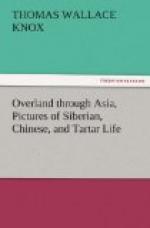In the phrase, “pigeon-English,” the word pigeon means “business,” and the expression would be more intelligible if it were “business-English.” Many foreigners living in China have formed the habit of using this and other words in their Chinese sense, and sometimes one hears an affair of business called “a pigeon.” A gentleman whom I met in China used to tell, with a great deal of humor, his early experiences with the language.
“When I went to Shanghae,” said he, “I had an introduction to a prominent merchant, who received me very kindly, and urged me to call often at his office. A day or two later I called, and inquired for him. ‘Won’t be back for a week or two,’ said the clerk; ’he has gone into the country, about two hundred miles, after a little pigeon.’ I asked no questions, but as I bowed myself out, I thought, ’He must be a fool, indeed. Go two hundred miles into the country after a pigeon, and a little one at that! He has lost his senses, if he ever possessed any.’”
Nearly all the trade with China is carried on at the Southern and Eastern ports, and comparatively few of the foreign merchants in China have ever been at Pekin, which was opened only a few years ago. But the war with the allied powers, the humiliation of the government, the successes of the rebels, and the threatened extinction of the ruling dynasty, led to important changes of policy. The treaty of Tientsin, in 1860, opened the empire as it had never been open before. Foreigners could travel in China where they wished, for business or pleasure, and the navigable rivers were declared free to foreign boats. Pekin was opened to travelers but not to foreign merchants; but it is probable that commerce will be carried to that city before long. There is an extensive trade at Tientsin, ninety miles south of the capital, and when it becomes necessary to carry it to the doors of the palace of the Celestial ruler, the diplomats will not be slow to find a sufficient pretext for it.




